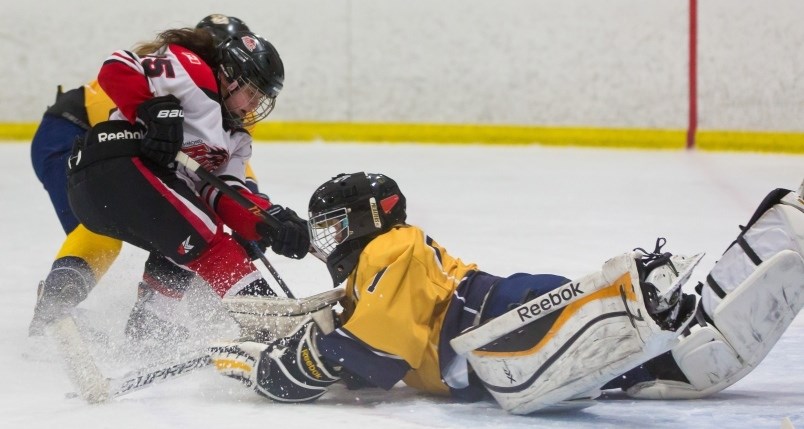Until her daughter, Gillian, expressed interest in playing girls hockey, the closest connection Larissa Lapierre had to the sport was a nephew who played.
On April 27, Lapierre was named by British Columbia Premier John Horgan as one of 20 recipients of a BC Achievement Community Award for her contributions to helping grow female hockey in the Tri-Cities and beyond.
Eager to support her daughter, but with not much hockey experience or knowledge of her own, Lapierre got involved behind the scenes. She served nine years on the executive of the Tri-Cities Female Hockey Association, the past five as president.
In that time, the ranks of its Tri-City Predators teams have grown to about 250 players from five to 21 years old. They’re from all three Tri-Cities as well as Anmore, and they play at all levels, from recreational to competitive with aspirations of playing college hockey.
It’s satisfying the hockey itch of such a wide demographic that Lapierre counts as one of the association’s real strengths. She said that unlike boys hockey, where development paths and hierarchies have been entrenched for decades, girls hockey started with a blank page and has been able to craft its own story.
“We can figure out what’s working,” Lapierre said. “It’s a bit of grassroots, let’s get back to basics, let’s get people excited about hockey.”
One way that’s been accomplished is through the development of close collaborations with other female hockey leagues around the Lower Mainland to share information and work out solutions to common issues like developing elite players, while still maintaining a supportive environment for those just learning the game.
“The challenge is keeping the balance between competition and fun,” Lapierre said, adding the two don’t have to be mutually exclusive.
While some girls looking to accelerate their development may opt to play in a boys league, more and more are discovering they can get that and enjoy the camaraderie and lifelong social connections forged playing with other girls.
A prime example is Port Moody’s Jenna Buglioni, who returned to the Predators’ fold after playing five years in a boys league and last year helped Canada win a silver medal at the IIHF U18 women’s world hockey championship in Bratislava, Slovakia. In September, she’ll head to Ohio State University on a hockey scholarship.
Lapierre said top players like Buglioni can be a catalyst for younger players. Equally important, though, are the increasing numbers of women getting behind the bench to coach, as well as those continuing to play by joining women’s leagues. They’re showing hockey can be forever.
“I just want for our girls to have that lifelong relationship with the game,” Lapierre said. “There’s so many life lessons to be learned and friendships to be made.”



